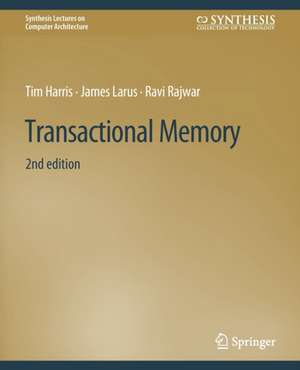Transactional Memory, Second Edition: Synthesis Lectures on Computer Architecture
Autor Tim Harris, James Larus, Ravi Rajwaren Limba Engleză Paperback – 2 iun 2010
Din seria Synthesis Lectures on Computer Architecture
-
 Preț: 359.05 lei
Preț: 359.05 lei - 18%
 Preț: 690.22 lei
Preț: 690.22 lei - 20%
 Preț: 281.76 lei
Preț: 281.76 lei -
 Preț: 453.85 lei
Preț: 453.85 lei -
 Preț: 226.98 lei
Preț: 226.98 lei -
 Preț: 388.52 lei
Preț: 388.52 lei -
 Preț: 353.79 lei
Preț: 353.79 lei -
 Preț: 481.05 lei
Preț: 481.05 lei -
 Preț: 261.32 lei
Preț: 261.32 lei -
 Preț: 413.27 lei
Preț: 413.27 lei -
 Preț: 494.18 lei
Preț: 494.18 lei -
 Preț: 260.56 lei
Preț: 260.56 lei -
 Preț: 194.92 lei
Preț: 194.92 lei -
 Preț: 450.11 lei
Preț: 450.11 lei -
 Preț: 319.21 lei
Preț: 319.21 lei -
 Preț: 449.53 lei
Preț: 449.53 lei -
 Preț: 264.41 lei
Preț: 264.41 lei -
 Preț: 418.07 lei
Preț: 418.07 lei -
 Preț: 386.22 lei
Preț: 386.22 lei -
 Preț: 486.98 lei
Preț: 486.98 lei -
 Preț: 264.20 lei
Preț: 264.20 lei -
 Preț: 383.71 lei
Preț: 383.71 lei -
 Preț: 346.86 lei
Preț: 346.86 lei -
 Preț: 265.18 lei
Preț: 265.18 lei -
 Preț: 260.18 lei
Preț: 260.18 lei -
 Preț: 191.48 lei
Preț: 191.48 lei -
 Preț: 206.29 lei
Preț: 206.29 lei -
 Preț: 205.92 lei
Preț: 205.92 lei -
 Preț: 205.70 lei
Preț: 205.70 lei -
 Preț: 207.06 lei
Preț: 207.06 lei -
 Preț: 260.95 lei
Preț: 260.95 lei -
 Preț: 261.91 lei
Preț: 261.91 lei -
 Preț: 192.63 lei
Preț: 192.63 lei -
 Preț: 262.09 lei
Preț: 262.09 lei -
 Preț: 259.41 lei
Preț: 259.41 lei -
 Preț: 260.95 lei
Preț: 260.95 lei -
 Preț: 456.66 lei
Preț: 456.66 lei -
 Preț: 261.53 lei
Preț: 261.53 lei -
 Preț: 486.42 lei
Preț: 486.42 lei -
 Preț: 210.55 lei
Preț: 210.55 lei -
 Preț: 387.58 lei
Preț: 387.58 lei -
 Preț: 448.38 lei
Preț: 448.38 lei -
 Preț: 264.20 lei
Preț: 264.20 lei -
 Preț: 262.68 lei
Preț: 262.68 lei -
 Preț: 263.06 lei
Preț: 263.06 lei - 20%
 Preț: 288.91 lei
Preț: 288.91 lei -
 Preț: 260.95 lei
Preț: 260.95 lei -
 Preț: 313.82 lei
Preț: 313.82 lei
Preț: 323.45 lei
Nou
Puncte Express: 485
Preț estimativ în valută:
61.89€ • 64.62$ • 51.22£
61.89€ • 64.62$ • 51.22£
Carte tipărită la comandă
Livrare economică 04-18 aprilie
Preluare comenzi: 021 569.72.76
Specificații
ISBN-13: 9783031006005
ISBN-10: 3031006003
Ilustrații: XV, 247 p.
Dimensiuni: 191 x 235 mm
Greutate: 0.46 kg
Ediția:2
Editura: Springer International Publishing
Colecția Springer
Seria Synthesis Lectures on Computer Architecture
Locul publicării:Cham, Switzerland
ISBN-10: 3031006003
Ilustrații: XV, 247 p.
Dimensiuni: 191 x 235 mm
Greutate: 0.46 kg
Ediția:2
Editura: Springer International Publishing
Colecția Springer
Seria Synthesis Lectures on Computer Architecture
Locul publicării:Cham, Switzerland
Cuprins
Introduction.- Basic Transactions.- Building on Basic Transactions.- Software Transactional Memory.- Hardware-Supported Transactional Memory.- Conclusions.
Notă biografică
Tim Harris is a Senior Researcher at MSR Cambridge where he works on abstractions for using multi-core computers. He has worked on concurrent algorithms and transactional memory for over ten years, most recently, focusing on the implementation of STM for multi-core computers and the design of programming language features based on it. Harris is currently working on the Barrelfish operating system and on architecture support for programming language runtime systems. Harris has a BA and PhD in computer science from Cambridge University Computer Laboratory. He was on the faculty at the Computer Laboratory from 2000-2004 where he led the department's research on concurrent data structures and contributed to the Xen virtual machine monitor project. He joined Microsoft Research in 2004. James Larus is a Research Area Manager for programming languages and tools at Microsoft Research. He manages the Advanced Compiler Technology, Human Interaction in Programming, Runtime Analysis and Design, and Software Reliability Research groups and co-lead the Singularity research project. He joined Microsoft Research as a Senior Researcher in 1998 to start and, for five years, lead the Software Productivity Tools (SPT) group, which was one of the most innovative and productive groups in the areas of program analysis and programming tools. Before joining Microsoft, Larus was an Assistant and Associate Professor at the University of Wisconsin-Madison, where he co-led the Wisconsin Wind Tunnel research project with Professors Mark Hill and David Wood. This DARPA and NSF-funded project investigated new approaches to simulating, building, and programming parallel shared-memory computers. In addition, Larus's research covered a number of areas: new and efficient techniques for measuring and recording executing programs' behavior, tools for analyzing and manipulating compiled and linked programs, programming languages, tools for verifying program correctness, compiler analysis and optimization, and custom cache coherence protocols. Larus received a PhD from the University of California at Berkeley in 1989, and an AB from Harvard in 1980. Tools (SPT) group, which was one of the most innovative and productive groups in the areas of program analysis and programming tools. Before joining Microsoft, Larus was an Assistant and Associate Professor at the University of Wisconsin-Madison, where he co-led the Wisconsin Wind Tunnel research project with Professors Mark Hill and David Wood. This DARPA and NSF-funded project investigated new approaches to simulating, building, and programming parallel shared-memory computers. In addition, Larus's research covered a number of areas: new and efficient techniques for measuring and recording executing programs' behavior, tools for analyzing and manipulating compiled and linked programs, programming languages, tools for verifying program correctness, compiler analysis and optimization, and custom cache coherence protocols. Larus received a PhD from the University of California at Berkeley in 1989, and an AB from Harvard in 1980.
